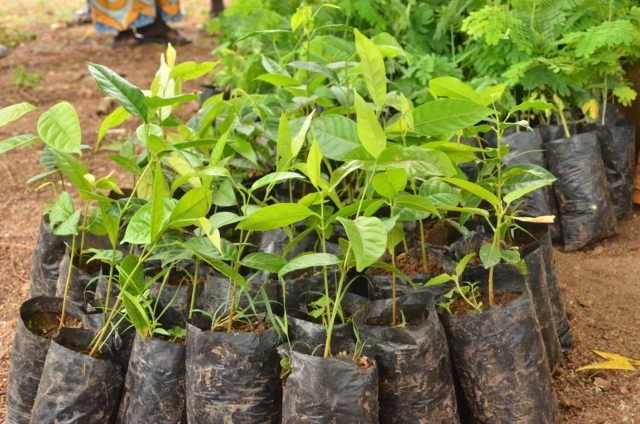We were told to plant trees, 5 million of them. Why? President Akufo-Addo explained: “Together, we must and will protect our environment and ecosystem and we must contribute to the world’s agenda at combating global warming”. He added, "We have to protect planet Earth and our motherland Ghana. I appeal to all Ghanaians to embrace the green Ghana initiative."
Climate change is here now. The president, like many others hopes that planting trees can “combat global warming.” Last year Ethiopia planted 350 million trees in a single day.
Planting 5 million trees is not enough. Necessary yes, sufficient no. To tackle climate change in Ghana, a transition to agroecological agriculture is indispensable.
Agriculture is a major emitter of greenhouse gases, which contribute to climate change. Approximately 30% of greenhouse gas emissions are linked to agriculture. To be specific, industrial agriculture, the type of agriculture that is considered “modern” because it is based on the intensive use of petroleum based chemical fertilizers and pesticides.
To tackle climate change, we need a type of agriculture that reduces the amount of carbon released into the atmosphere. We need agroecological agriculture.
To understand the critically important contributions that agroecology can provide to Ghana, read the High Level Panel of Experts (HLPE) report on “Agroecological approaches and other innovations for sustainable agriculture and food systems that enhance food security and nutrition”. The takeaway: agroecological agriculture will contribute to cooling down our planet.
Agroecological agriculture prioritises improving soil health, the level of soil organic matter and soil life. It does this by minimizing the release of carbon into the atmosphere. For example, agroecological agriculture includes minimum (or zero) tillage, the use of cover crops, crop rotation, the integration of forestry and crop production and the reintegration of lifestock into crop production systems and integrated pest management. All of these combine to reduce the carbon generated by agriculture. Agroecological agriculture is part of the solution to climate change.
Therefore, Ghana’s agriculture must change. It is time for a transition to agroecological agriculture. We need a greener agriculture. For example, we need more agroforestry. We need more permaculture. We need more of the best in indigenous/traditional agricultural practices that preserve biodiversity and the ecosystem.
We need a shift in thinking at the Ministry of Food and Agriculture; the focus cannot be mainly on increasing production. There needs to be much greater attentiveness to the production of nutritionally dense food and the environmental impact of farming. By greening Ghana’s agriculture, we will be adapting to and mitigating climate change.
To reduce the impact of agriculture on climate change in Ghana, we need an end to subsidies on synthetic fertilizers and an expansion of the supply of subsidized organic fertilizers, especially ones produced in Ghana, by indigenous businesses. To make Ghana’s agriculture greener, we need to promote tree based nitrogen fixation as well as reintegrate lifestock production with crop farming. Also, Ghana will need to promote diverse landscapes rather than monoculture plantations.
Beyond planting trees, Ghana need’s to focus more on enabling famer managed natural regeneration (FMNR). The benefit here is that the existing ecosystem is allowed to reestablish itself. This is the most sustainable way.
Even as Ghana plants five million trees, it is critical that efforts to protect existing forest and water bodies increase. When trees are cut, they release carbon into the atmosphere. Therefore, stopping the indiscriminate cutting down of trees is critical.
Significantly curtailing the destruction of the existing forest should not be limited to the devastation caused by illegal mining but should include any so-called “legal” mining in forest reserves. Bringing deforestation to an abrupt halt is critically important.
Critically, re-afforestation initiatives, the planting trees, no matter how many, are not a substitute for reducing emissions. To reduce the emission of greenhouse gases, we must reduce the contributions caused by agriculture.
With agroecology we can usher in an agricultural transition that contributes to reducing the negative impact of agriculture on the climate and strengthens resilience to climate change.
We get more! Agroecology will improve the lives of small holder farmers, who grow the majority of the food we eat, improve the nutritional quality of food, promote biodiversity, and enable a fair and just food system.
*****
Chaka Uzondu (Ph.D.) is a researcher and policy analyst. His writings cover topics ranging from agroecology, climate change, economic justice, food sovereignty, health, housing, political ecology/economy, and water, sanitation, and hygiene (WASH).
Latest Stories
-
We didn’t sneak out 10 BVDs; they were auctioned as obsolete equipment – EC
2 hours -
King Charles to resume public duties after progress in cancer treatment
3 hours -
Arda Guler scores on first start in La Liga as Madrid beat Real Sociedad
3 hours -
Fatawu Issahaku’s Leicester City secures Premier League promotion after Leeds defeat
3 hours -
Anticipation builds as Junior Speller hosts nationwide auditions
4 hours -
Etse Sikanku: The driver’s mate conundrum
4 hours -
IMF Deputy Chief worried large chunk of Eurobonds is used to service debt
5 hours -
Otumfuo Osei Tutu II celebrates 25 years of peaceful rule on golden stool
5 hours -
We have enough funds to pay accruing benefits; we’ve never missed pension payments since 1991 – SSNIT
5 hours -
Let’s embrace shared vision and propel National Banking College – First Deputy Governor
6 hours -
Liverpool agree compensation deal with Feyenoord for Slot
6 hours -
Ejisu by-election: There’s no evidence of NPP engaging in vote-buying – Ahiagbah
6 hours -
Ejisu by-election: Independent ex-NPP MP’s campaign team warns party against dubious tactics
6 hours -
ZEN Petroleum supports Tse-Addo Future Leaders School
7 hours -
NPP must win back Adentan seat in 2024 polls – Obeng Fosu
7 hours

